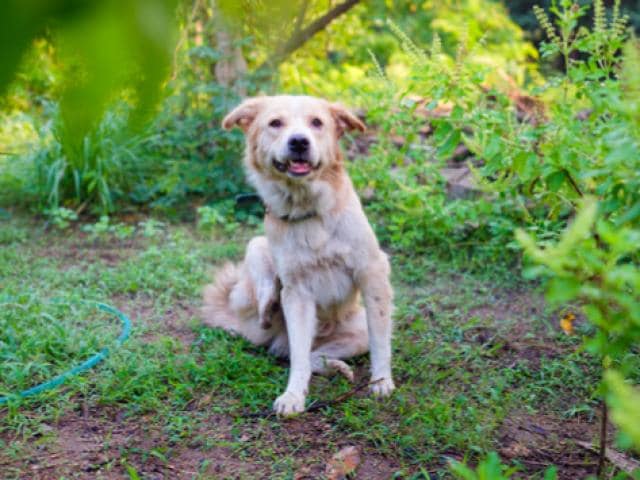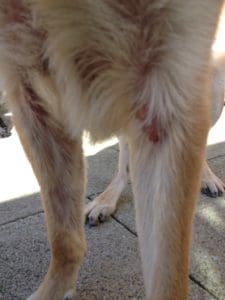
Yes dogs can have allergies to pollen. Some dogs are allergic to grass and pollen their entire lives while other dogs develop allergies as they mature.

Grass allergies in dogs are caused by pollen which is the powdery yellow material that you see all over everything in the spring and summer.
Grass pollen allergy dog. In reality however the actual cause of the grass allergy in a dog is the pollen. The grass pollen refers to the powdery yellow material produced by the male seed plants and is used for fertilization. The pollen is characterized by microscopic grains and is transported from plant to plant by birds bees or wind.
Grass allergies also known as pollen allergies are the most common type that appear in dogs. The pollen is absorbed in the dogs skin and can cause an allergic reaction. The pollen is mostly spread through direct contact with grass though it also can be transferred indirectly from people bringing it in from the outside.
Grass allergies in dogs are caused by pollen which is the powdery yellow material that you see all over everything in the spring and summer. This powder is the substance that flowers and grasses put out to be transported from plant to plant by the birds bees or wind. There are several ways your dog can be exposed to grass pollen.
Some dogs are allergic to grass and pollen their entire lives while other dogs develop allergies as they mature. Other common environmental triggers are mold spores and dust or storage mites. Blue says that just as you can go weeks with no symptoms and then have watery eyes and all the other symptoms of an allergy so can your dog.
Dogs arent allergic to the grass itself but rather the grass pollen that is floating through the air. The pollen is microscopic and only seen when it accumulates in mass quantities in the spring. Your dog may absorb these tiny spores in his skin which will cause the allergic reaction in dogs.
Dog pollen allergy can be triggered by Highly allergic pollen grass like Bermuda grass Johnson grass Redtop Sweet Vernal and Timothy grass. Pollen is the element that fertilizes the flowering plants. Its a fine powder that is released from tree weeds and grasses year-round though mainly in the spring.
Can dogs have allergies to pollen. Yes dogs do get pollen allergies. If your dog is allergic to grass there are several ways you can help him feel better.
You can give him steroids antihistamines omega-3 a fish and sweet potato diet colloidal oatmeal floral oils and aloe vera. Always consult with a veterinarian to be sure it is not a serious condition. Can dogs be allergic to pollen.
Yes dogs can have allergies to pollen. Dogs might come into direct contact with pollen simply by touching pollen-packed plants with their face or feet. But they could also simply inhale pollen that is floating in the air.
Either way a pollen allergy both in dogs and humans is an overactive immune systems reaction to the stuff. Try to work out when in the year your pet is most affected by their pollen allergy. This will help give you an idea of the type of pollen causing the problem and the areas you might want to avoid.
May June and July. June July and August. These timings can vary depending on where you live.
Testing for a Dog Grass Allergy. A dog grass allergy is a bit challenging to test for but the most accurate way to be certain the symptoms are being caused by grass pollen is to have a professional conduct an intradermal allergy test. Intradermal allergy testing involves injecting small quantities of allergens into the dogs skin.
A more recent cross-sectional study in 651 atopic dogs indicated that sensitization between tree weed and grass pollen but not to other allergen sources were in 94 of cases statistically associated. The authors pointed out that sensitization must clearly be distinguished from clinically relevant sensitization leading to symptoms. An allergy symptom can manifest in many ways and the most common for dogs is itching.
Allergy symptoms may also occur from food sources flea bites dust mites mildew or molds and can present in ways which can be similar to a reaction to pollen. A pollen allergy is considered an inhalant allergy which is referred to as atopy by veterinarians. Based on our experience with canine allergy we evaluated and treated a dog with severe grass and ragweed allergy whose allergic dermatitis was uncontrolled by H1 blockers and topical corticosteroids.
The dog was miserable during the. The short answer is yes. Surprisingly a grass allergy in dogs is more common than you may think.
Studies indicate that more than 80 percent of dogs displayed signs of an allergy to grass weeds and tree pollen. However owners are often unaware that their dog is allergic to grass or what to do if your dog is allergic to grass. Blown from the wind grass pollen can travel for many miles.
While in humans allergies to grasses and pollen produce respiratory problems such as sneezing wheezing runny eyes and runny noses in dogs allergic to grass symptoms are more likely to affect their skin. In the case of grass allergies the culprit is typically the pollen produced by the grass. This pollen may come into contact with your dog when he is walking around outside.
He may also and usually more likely breathe the pollen in while hes either outdoors or even indoors as well. When your allergic pets body detects grass pollens in its system hell respond by producing. Grass pollen allergy in dogs is fairly common and you would think that since grass pollen is an inhaled allergen the symptoms would be similar to us as humans.
However dogs do not suffer as much from runny noses or sneezing but most commonly break out in skin-related reactions. An allergy to grass is a very common seasonal allergy that affects our canine friends. Dogs that are allergic to grass will experience negative reactions to the grass pollen and can show symptoms such as itchy paws and excessive licking.
Seasonal grass allergies are most common in the Spring and early Summer when grass pollen is most active. Just as some people get hay fever some dogs are susceptible to airborne allergens such as grass pollen. Dogs sometimes experience respiratory problems but more often their allergies cause skin irritation and itching.
Grass pollen is one of many allergens that can cause atopy in your dog. Often more than one allergen is responsible for symptoms. For example a dog may react to something in the environment such as tree pollen grass pollen weed pollen mould spores house dust or house dust mites.
The dog may be allergic to a. Pratense allergoms for dogs 15 individuals allergic to grass pollen and sensitized to D. Pratense proteomes were separated by isoelectric focusing IEF one-dimensional 1-D and two-dimensional 2-D sodium dodecyl sulphate polyacrylamide gel.